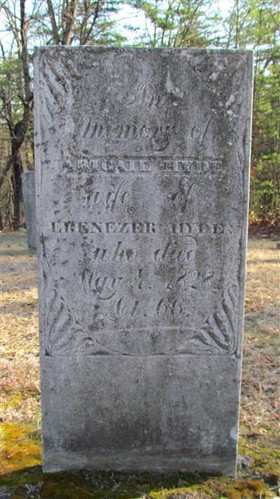Abigail NEWTON, second wife of Ebenezer HYDE, Sr. like many women of her day, married a man whose wife died and left him with small children. (photographed by William Dunbar) Close-up of her name on the stone.
Unlike the record of his first marriage, which I can't find, are TWO "records" of marriage for Ebenezer and Abigail. This might be because the NEWTON family was a prominent family in this area.
Marriage Banns, although common, are not something I have consistently found as I search vital records. This one looks like this:
HYDE: (see Hide), Ebenezer and Abigail Newton of Southborough, int. May 4, 1794. Town Page Detail: Sutton Marriage Sutton, MA
Since Ruth ONTHANK, his first wife died at age 28 on 8 Sept, 1793, this intention to marry the following May in 1794, may seem hasty. But, Ebenezer had Ebenezer (age 9), Ruth (age 8), and little William (age 5) who needed a mother. I always feel sympathetic toward these previously maiden women who took on an established household. Such in life in the 1700s in New England.
Abigail married Ebenezer the following July as evidenced by the vital record of their marriage:
NEWTON: Abigail and Ebenezer Hide of Sutton, July 13, 1794. Town Page Detail: Southborough Marriage Southborough, MA
They had five more children. How did New England women manage this many children?
Ebenezer's gravestone and his second wife Abigail have matching gravestones obviously carved by the same stone cutter.
Abigail was born 20 June 1762 in Southborough , a daughter of David NEWTON and his wife Abigail. She died at the age of 66 in 1828, as a widow and is buried in Dodge Cemetery in Sutton.


2 comments:
Great story, Midge. My granny was in the same boat. My granddad's first wife died in childbirth, leaving him with 5 young children. He and my grandmother had another 15 together. After they were all grown, my gran was never able to get used to a quiet house.
Hi Midge, I think New England women had a lot of children and managed because the children were well behaved, easily shared small bedrooms, and went off to either work or extended schooling at a young age. Mothers also helped each other and had other women helping on a volunteer basis, Some also had servants who were paid small wages.
Post a Comment